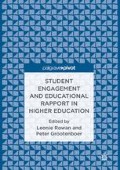Abstract
This chapter investigates issues relating to student satisfaction with their university teaching experiences. Acknowledging previous literature that has often linked student ratings of teachers and courses with factors such as lecturer personality, course content, grade inflation and academic achievement, this chapter revisits the question of “what makes students happy?” Drawing upon innovative data collection techniques including doorstop interviews—and involving undergraduate students as co-researchers making sense of the data collected—the paper explores a range of significant and unexpected differences between what staff and students identify as the key features of quality teaching and factors that impact most significantly upon student satisfaction. With a particular focus on actions that make students feel valued, respected and included, the chapter provides valuable insights into the creation of student-centred learning environments.
Access this chapter
Tax calculation will be finalised at checkout
Purchases are for personal use only
References
Anderson, H.M., Cain, J., & Bird, J. (2005). Online student course evaluations: Review of literature and a pilot study. American Journal of Pharmaceutical Education, 69, 34–43.
Baker, P., & Copp, M. (1997). Gender matters most: The interaction of gendered expectations, feminist course content, and pregnancy in students’ course evaluations. Teaching Sociology, 25(1), 29–43.
Delucchi, M. (2000). Don’t worry, be happy: Instructor likeability, student perceptions of learning, and teacher ratings in upper-level sociology courses. Teaching Sociology, 22(3), 220–231.
Douglas, J., Douglas, A., & Barnes, B. (2006). Measuring student satisfaction at a UK university. Quality Assurance in Education, 14(3), 251–267.
Elliott, K.M., & Shin, D. (2002). Student satisfaction: An alternative approach to assessing this important concept. Journal of Higher Education Policy and Management, 24(2), 197–209. doi:10.1080/1360080022000013518.
Emery, C.R., Kramer, T.R., & Tian, R.G. (2003). Return to academic standards: A critique of student evaluations of teaching effectiveness. Quality Assurance in Education, 11(1), 37–46.
Freire, P. (2000). Pedagogy of the oppressed (30th anniversary ed.). New York: Continuum.
Gruber, T., Reppel, A., & Voss, R. (2010). Understanding the characteristics of effective professors: The student’s perspective. Journal of Marketing for Higher Education, 20(2), 175–190. doi:10.1080/08841241.2010.526356.
hooks, bell. (1994). Teaching to transgress: Education as the practice of freedom. London: Routledge.
Jiang, M., & Ting, E. (2000). A study of factors influencing students’ perceived learning in a web-based course environment. International Journal of Educational Telecommunications, 6(4), 317–338.
Johnsen, H.L., Pacht, M., Van Slyck, P., & Tsao, T.M. (2009). The messy teaching conversation: Toward a model of collegial reflection, exchange, and scholarship on classroom problems. Teaching English in the Two-Year College, 37(2), 119–136.
Jones, J. (1989). Students’ ratings of teacher personality and teaching competence. Higher Education, 18(5), 551–558.
Krause, K.-L., Hartley, R., James, R., & McInnis, C. (2005). The first year experience in Australian universities: Findings from a decade of national studies. Melbourne: Centre for the Study of Higher Education.
Krause, K.-L., McEwen, C., & Blinco, K. (2009). E-learning and the first year experience: A framework for best practice. Paper presented at the EDUCAUSE Australasia Conference, Perth, Western Australia, May 3–6, 2009. Retrieved from http://www98.griffith.edu.au/dspace/bitstream/handle/10072/31818/61094_1.pdf?sequence=1. Accessed 26 April 2016.
Larkin, K., Rowan, L., Garrick, B., & Beavis, C. (2016). Student perspectives on first year experience initiatives designed for pre-service teachers in their first weeks of university study. Journal of University Teaching & Learning Practice, 13(1), 7.
Li-Ping Tang, T. (2001). Teaching evaluation at a public institution of higher education: Factors related to the overall teaching effectiveness. Public Personnel Management, 26(3), 379–389.
Mitchell, D.M. (2014). Evolving practice: A relational framework for developing understandings of university teaching practice. Australian Journal of Teacher Education, 39(10), 29–46. doi:10.14221/ajte.2014v39n10.3.
Moore, M.G. (1989). Editorial: Three types of interaction. American Journal of Distance Education, 3(2), 1–7. doi:10.1080/08923648909526659.
Palmer, P. (1997). The heart of a teacher: Exploring the inner landscape of a teacher’s life. San Francisco: Jossey-Bass.
Rowan, L. (2013). What price success? The impact of the quest for student satisfaction on university academics. International Journal of Pedagogies and Learning, 8(2), 132–146.
Rowan, L., & Bigum, C. (Eds.). (2012). Transformative approaches to new technologies and student diversity in futures oriented classrooms. Dordrecht: Springer.
Strauss, A.L. (1987). Qualitative analysis for social scientists. New York: Cambridge University Press.
Strauss, A.L., & Corbin, J.M. (1998). Basics of qualitative research: Techniques and procedures for developing grounded theory. Thousand Oaks: Sage.
Titus, J.J. (2008). Student ratings in a consumerist academy: Leveraging pedagogical control and authority. Sociological Perspectives, 51(2), 397–422.
Winstone, N., & Parker, M. (2015). The role of students in pedagogical research projects: Subjects, participants, partners, consultants. Retrieved from https://www.heacademy.ac.uk/role-students-pedagogical-research-projects-subjects-participants-partners-consultants. Accessed 13 March 2016.
Wright, R., Jones, G., & D’Alba, A. (2013). Person over pedagogy: Rapport-building traits of online instructors. In T. Bastiaens & G. Marks (Eds.), Proceedings of E-Learn: World Conference on E-Learning in Corporate, Government, Healthcare, and Higher Education 2013 (pp. 1603–1612). Chesapeake: Association for the Advancement of Computing in Education (AACE).
Author information
Authors and Affiliations
Corresponding author
Editor information
Editors and Affiliations
Rights and permissions
Copyright information
© 2017 The Author(s)
About this chapter
Cite this chapter
Rowan, L., Townend, G. (2017). No Hugs Required: University Student Perspectives on the Relationship Between Excellent Teaching and Educational Rapport. In: Rowan, L., Grootenboer, P. (eds) Student Engagement and Educational Rapport in Higher Education. Palgrave Macmillan, Cham. https://doi.org/10.1007/978-3-319-46034-5_6
Download citation
DOI: https://doi.org/10.1007/978-3-319-46034-5_6
Published:
Publisher Name: Palgrave Macmillan, Cham
Print ISBN: 978-3-319-46033-8
Online ISBN: 978-3-319-46034-5
eBook Packages: EducationEducation (R0)

